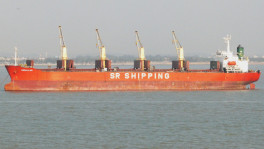UAE's Hope Probe enters orbit in first Arab Mars mission
The Mars programme is part of the UAE’s efforts to develop its scientific and technological capabilities and reduce its reliance on oil

The United Arab Emirates' first mission to Mars reached the red planet and entered orbit on Tuesday after a seven-month, 494 million-km (307 million-mile) journey, allowing it to start sending data about the Martian atmosphere and climate.
The Mars programme is part of the UAE's efforts to develop its scientific and technological capabilities and reduce its reliance on oil. The UAE Space Agency, the fifth globally to reach the planet, even has a plan for a Mars settlement by 2117.
"Contact with #HopeProbe has been established again. The Mars Orbit Insertion is now complete," said the Mohammed Bin Rashid Space Centre, where the ruler of Dubai and the crown prince of Abu Dhabi were present to receive the news.
The attempt had a 50% chance of failing, Dubai's ruler and UAE Vice President Sheikh Mohammed bin Rashid Al Maktoum had said. To enter Mars' orbit, the probe needed to burn around half its 800 kg (1,760 lbs) of onboard fuel to slow down enough not to overshoot, the most dangerous part of the journey.
"Today is the start of a new chapter in Arab history ... of trust in our capability to compete with other nations and people," Sheikh Mohammed tweeted after the probe entered orbit. "The UAE will celebrate its Golden Jubilee with science, culture and inspiration because we aim to build a model of development."
This year marks 50 years since independence from Britain and the founding of the UAE federation, which groups seven emirates, including Dubai. Mars probes launched by China and NASA just after the UAE's lift-off in July are also set to reach the planet this month.
Martian Atmosphere
The Emirates Mars Mission, which has cost around $200 million, launched the Hope Probe from a Japanese space centre. It aims to provide a complete picture of the Martian atmosphere for the first time, studying daily and seasonal changes.
Minister of State for Advanced Technology and chair of the UAE Space Agency Sarah al-Amiri told Reuters it would take a few weeks to start collecting a mixture of data and images, which could be made publicly available as early as September.
"It's an endeavour in developing capabilities and talent in the country, it is something that has never been done before in terms of utilising a planetary exploration mission to do this," she said.
The UAE first announced plans for the mission in 2014 and launched a National Space Programme in 2017 to develop local expertise. Its population of 9.4 million, most of whom are foreign workers, lacks the scientific and industrial base of the big spacefaring nations.
Hazza al-Mansouri became the first Emirati in space in 2019 when he flew to the International Space Station.
To develop and build the Hope Probe, Emiratis and Dubai's Mohammed Bin Rashid Space Centre (MBRSC) worked with US educational institutions.


 Keep updated, follow The Business Standard's Google news channel
Keep updated, follow The Business Standard's Google news channel
















